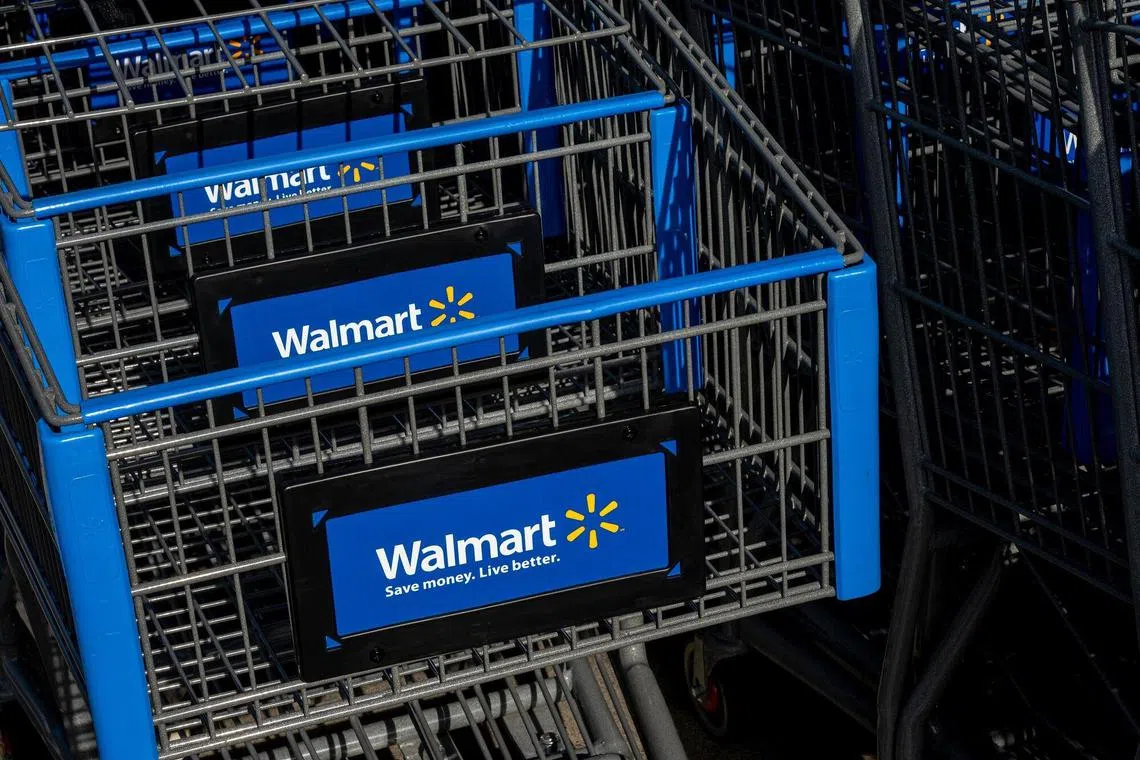Walmart, other US companies warn Trump tariffs could mean higher prices
Sign up now: Get ST's newsletters delivered to your inbox

Walmart, the largest US retailer, said on Nov 19 that its prices could increase if tariffs rise.
PHOTO: BLOOMBERG
Follow topic:
Bengaluru - Corporate executives were taking a wait-and-see approach to US President-elect Donald Trump’s vow to impose heavy tariffs on imports when he takes office in January, but many have raised concerns about the effect such levies will have on inflation.
Numerous major US corporations addressed tariffs at recent investor events and on conference calls, including some after the Nov 5 election.
Walmart, the largest US retailer, warned on Nov 19 after reporting results that its prices could increase if tariffs rise.
“We’re concerned that significantly increased tariffs could lead to increased costs for our customers at a time when they are still feeling the remnants of inflation,” a Walmart spokesperson said.
Trump has vowed to make tariffs, which are a fraction of US tax collections, central to his economic agenda.
Executives have been increasingly fielding questions on the subject, with many noting ongoing efforts to continue to diversify their supply chains, particularly away from China, Trump’s top target.
Since the beginning of September, executives from nearly 200 companies in the S&P 1500 Composite index discussed tariffs on earnings calls or at investor conferences, nearly doubling the same period in the run-up to the 2020 election, and far more than the 23 mentions in 2023, according to London Stock Exchange Group data.
“Roughly 40 per cent of our cost of goods sold are sourced outside of the US, and that includes both direct imports and national brands through our vendor partners,” Lowe’s chief financial officer Brandon Sink said on Nov 19. “And as we look at the potential impacts (of tariffs), it certainly would add to product costs.”
Trump has floated the idea of 60 per cent tariffs on China,
Oxford Economics estimated a 60 per cent China tariff could boost US inflation by 0.7 percentage points, and across-the-board tariffs would boost inflation by 0.3 points.
Oxford believes any tariffs would be gradually introduced, but some analysts are worried about a shock effect.
“Trump 47 won’t be a mere replay of Trump 45,” said Annex Wealth Management chief economist Brian Jacobsen, noting that the president-elect’s proposals now were “far more expansive.”
The sectors that account for the most imports to the United States include electronic products, transportation equipment, chemicals and minerals, according to the US International Trade Commission.
Taiwan, a key partner for the crucial US semiconductor industry, was a target of Trump’s rhetoric in the run-up to the election.
He suggested that Taiwan should pay for US protection against the threat of China – which claims the island as its own territory – and accused it of poaching the semiconductor industry.
Any retaliation may affect US tech giants like Apple, Nvidia and Qualcomm, which count Taiwan as a vital component of their supply chain.
Tariffs could raise prices on clothing, toys, furniture, appliances, footwear, and travel goods, particularly items where China is a major supplier, according to the National Retail Federation, a US trade group of which Walmart’s US head is the chairman.
“It is certainly one of the quickest things that could happen, because it could kind of happen with the stroke of a pen,” said Stanley Black & Decker CFO Patrick Hallinan.
He said current tariffs are costing it about US$100 million (S$133.8 million) a year, which could double under Trump’s proposals.
To be sure, companies started to shift production away from China during Trump’s first term, and continued to do so following legislation passed during Mr Joe Biden’s term designed to boost US manufacturing.
US goods imports from China peaked at US$538.5 billion in 2018, according to US Census Bureau data, and were US$433.3 billion over the 12 months ended in September.
Businesses may also be better prepared to deal with shifts following the Covid-19 pandemic, numerous labour strikes and disruptions to key waterways like the Panama and Suez canals, executives said.
“We’ve had so many disruptions and challenges that have forced us to make adaptions. We’re pretty well versed in managing through this,” Tapestry CFO Scott Roe said. REUTERS

